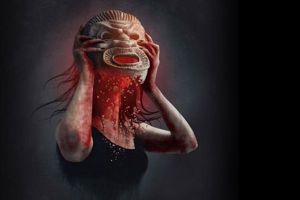
Richard Strauss’s fourth opera opened the very first season at the Royal Opera House in 1910, and has returned several times since. The present run proves that Elektra has lost none of its sensationalism, with an exhilarating interpretation led by Andris Nelsons and an eye-boggling dramatic vision from Charles Edwards. Although boasting excellent orchestral and vocal performances, I couldn’t help but feel that this Elektra was somewhat let down by the cluttered production.
A psychological study of the title character culminating in bloody murders and a dance of death, Elektra is undeniably disturbing. However, Charles Edward’s production (currently on its third outing at the Royal Opera House) strayed into the distasteful. A gruesome torture took place within the first fifteen minutes (leaving the bloodied fifth maid crawling about stage for the rest of the opera) and the dramatic denouement saw stricken maids dragging their way across the corpse-littered stage, one even hanging herself. A touch more restraint would have been appreciated: I felt that the emphasis upon gore detracted from the subtler psychological implications. Thankfully, the familial relations were presented more sensitively: the brother-sister relationship between Elektra and Orest was gently probed, and the complexities of the relationship between Elektra and Klytämnestra explored.
Richard Strauss’s fourth opera is classical myth refracted through a modernist lens, and the production certainly captured this collision. Elektra’s humble black tunic rubbed shoulders with Klytämnestra’s decadent floor-length dress and a Greek-inspired frieze adorned the wall facing. There were some nice touches, particularly the monumentalision of Agamemnon (represented by a bust) and Elektra’s desk (drawing attention to her passivity). Overall, though, it seemed that there were almost too many ideas and I couldn’t help feel that Edwards’ conception needed to be slightly more focused.
Things were looking brighter on the musical side. Andris Nelsons and the ROH Orchestra were on fine form, lending a sense of urgency to the unfolding drama. The ensemble was tight, bringing off devastating eruptions and delicate passages with élan. For me, Christine Goerke lacked a little je ne sais quoi as Elektra. Although she displayed impressive stamina, she was overpowered by the orchestra at some points and upper range was often short of fullness. Elektra’s spotlight was stolen by the rest of the family: most notably Adrianne Pieczonka as Chrysothemis. Simultaneously honeyed and intense, her top notes had a glorious amount of bloom. Meanwhile, Iain Paterson’s Orest was vigorous and tender, and Michaela Schuster’s highly strung Klytämnestra was powerful yet racked with doubt.
Ultimately, I was left frustrated that the dramatic aspect fell short of the musical. An overload of information on stage was distracting, failing to convey the dramatic arc of the opera with clarity and directness. From a vocal and orchestral point of view, the evening was satisfying indeed; I just left wishing that Edwards’ production had left such an impression.